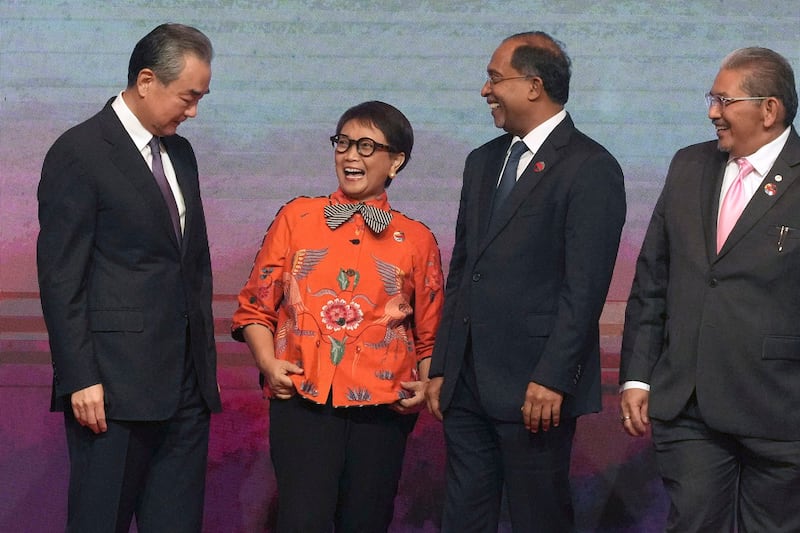The famed quip “There are three kinds of lies: Lies, damned Lies, and statistics” can be updated for the modern era with “confusion, damned confusion, and opinion Polls” in the wake of the 2024 State of Southeast Asia surveys of the region’s elites published this month by a think tank in Singapore
The annual report by the ISEAS-Yusof Ishak Institutehas sparked some alarmist headlines. "Majority in Southeast Asia would choose China over the U.S., survey suggests," Al Jazeera went with. Nikkei Asia intoned: "Majority of ASEAN people favor China over U.S., survey finds". Guess what Chinese media ran with? "Survey shows Southeast Asians favor China over U.S".
Was this actually what the survey revealed? Yes, but only if one takes only a cursory flick through its pages to copy and paste some regional averages.
The headlines were mostly generated by replies to question 31, an annual feature of the survey, which asks respondents: “If ASEAN were forced to align itself with one of the strategic rivals, which should it choose?”
As a regional average, 61.1% of all Southeast Asian respondents said they’d pick the United States over China in the 2023 poll. This year, however, only 49.5% selected the U.S..
The 50.5% who said they’d pick China over the U.S. represents a 1 percentage point difference, notwithstanding the drop in U.S. favorability. In a survey in which pollsters interviewed 1,994 people, the difference between choosing China over the U.S. comes down to the opinions of about 20 people – perhaps not a reliable measure of how a region of 660 million people regard the most important geopolitical issue of the day.

The survey calculates the average figures for ASEAN as a whole by equal proportion per country, so tiny Brunei, which reliably opts for China over the U.S., gets the same weighting as the far more populous and geopolitically-important Philippines, which is consistently pro-U.S.
The question itself asks whether ASEAN, not national governments, should pick between the U.S. and China.
It is hard to imagine such a weighty geopolitical decision could ever be taken by consensus in a 10-nation bloc whose members cannot agree on how to deal with the civil war in Myanmar. This makes the regional average worthless as a gauge since it presupposes an impossible outcome.
Support for China?
A closer look at the swing in support for China raises other questions. If China was becoming more popular, as replies to question 31 implied, we might expect to see China’s popularity rise across the survey. But that’s not the case.
Question 38: “How confident are you that China will ‘do the right thing’ to contribute to global peace, security, prosperity, and governance?” found that 29.5% of all respondents were “confident” or “very confident”. But, for the 2024 survey, it declined to 24.8%.
To question 22: “In your view, which country/regional organization is the most influential economic power in Southeast Asia?” Some 59.5% said China, down again from last year. And of those who said China is the most important economic partner, 67.4% said they were worried about China’s growing influence, again a higher percentage than last year.
And on question 24: “In your view, which country/regional organization has the most political and strategic influence in Southeast Asia?” the percentage who said China, 43.9%, was up from last year. But 73.5% who said so were worried about Beijing’s growing regional political and strategic influence.
Early in the survey, around half of all respondents expressed concern that ASEAN is becoming increasingly disunited, something this survey makes clear. Dig down into the questions, and one finds that sentiments in the region are equally split between the two superpowers.

On the core question ”If ASEAN were forced to align itself with one of the strategic rivals, which should it choose?” the regional average tilts in favor of China. But that regional average was massively skewed by a few countries.
In the 2023 survey, some 58.9% of Laotians picked the U.S. over China. This always seemed to be a very odd result, because Vientiane is one of Beijing’s closest allies, and because around 80% of Loatian respondents favored China over the U.S. in the 2021 and 2022 surveys. The 2023 results were something of an anomaly.
The 2024 results were also heavily skewed by Bruneians, who aren’t very influential on regional geopolitics. The number of respondents opting for the U.S. declined from 45% in 2023 to 29.9% in 2024. The percentage of Thais who would pick the U.S. over China fell from 56.9% in 2023 to 47.8%.
In an outcome that likely reflects anger at Washington’s support for Israel in the Gaza War, the percentage of Malaysians picking Washington over Beijing dropped from 45.2% to 24.9% over the past year, while those in Indonesia plunged from 46.3% to 26.8%. Next year, when the 2025 poll is published, the results could easily be different.
ASEAN’s divide
A majority from Brunei, Indonesia, Laos, Malaysia and Thailand said they’d pick China over the U.S.. A majority from Cambodia, Myanmar, the Philippines, Singapore and Vietnam chose the U.S. over China. By state, the regional bloc is equally split 5-5.
U.S. policy makers might take some comfort in the fact that the pro-U.S. stalwarts in ASEAN have been consistent throughout the years. In this year’s survey, 61.5% of Singaporeans chose the United States over China, compared to 61.1% in last year’s survey. Some 79.0% of Vietnamese said Washington over China, compared to 77.9% last year. And 83% of Filipinos were pro-U.S., up from 78.8% last year.

But the pro-Chinese camp fluctuates. Laos swung out of it in last year’s survey. Indonesia and Malaysia only became China-over-America in the 2022 survey, but they were previously U.S.-over-China.
Cambodians tend to swing back and forth. Bruneians have been the only group to consistently pick China over the U.S. since these surveys began.
Three Southeast Asian states – Singapore, the Philippines and Vietnam– are solidly pro-U.S. Only one is consistently pro-China (Brunei), and the others fluctuate each year.
This actually should give Beijing more cause for concern than Washington. America’s stalwarts aren’t for turning. Beijing’s backers appear fickle and flighty.
David Hutt is a research fellow at the Central European Institute of Asian Studies (CEIAS) and the Southeast Asia Columnist at the Diplomat. He writes the Watching Europe In Southeast Asia newsletter. As a journalist, he has covered Southeast Asian politics since 2014. The views expressed here are his own and do not reflect the position of RFA.
